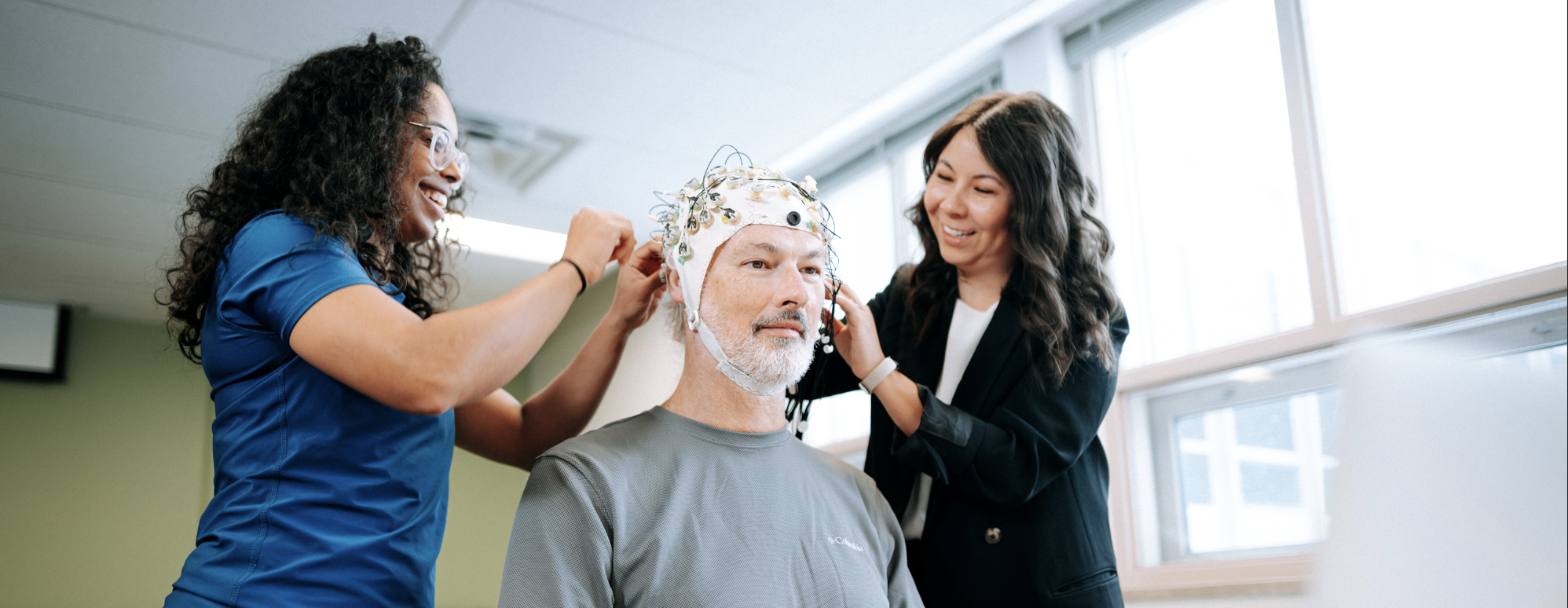
Outlined below are the current research projects at the Exercise, Mobility, and Brain Health Lab
Learning, Aging and Brain Health
Changes to memory and cognition are a normal process that occur naturally during the aging process. While this is a normal process, many interventions and training programs exist in order to slow or prevent the acceleration of cognitive decline. Previous research has shown evidence that older adults who participate in education can improve on certain cognitive tasks. However, future research is needed to investigate the structural and functional brain changes that may be causing these changes in cognition. This study investigates the structural and functional brain changes that may be causing changes in cognition in older adults who participate in education.
Currently recruiting participants who fit the following criteria:
- Participant's age must be between 60 and 80 years, inclusive.
- Participants must have completed high school education.
- Participants must currently live in their own home or residence.
- Participants must be comfortable reading, writing, and speaking in English.
- Participants must be right-handed.
- Participants must perceive a decline in their memory ability over the last 5 years.
- Participants must not have been diagnosed with a neurodegenerative disease, including dementia or cognitive impairment such as Alzheimer’s, Parkinson’s, or MS.
- Participants must not have been diagnosed with a psychiatric condition, such as depression or anxiety.
- Participants must not have had a stroke.
- Participants must not be currently taking or expecting to start taking any medications for Alzheimer's treatment, such as donepezil or galantamine.
- Participants must not be currently taking any medications for muscle spasms or seizures, for example, gabapentin, or valproic acid.
- Participants must not have any visual or auditory impairments, including but not limited to glaucoma, cataracts, being blind, or color-blind.
- Participants must not be planning on or currently participating in any other research study, including drug trials, exercise studies, etc.
Participants will receive an honorarium of $25 at the end of each time point - one payment after baseline measures and one payment after endpoint measures, for a total potential honorarium of $50.
If you are interested in participating, please reach out to Raphael Gabizaon rgabiazo@uwo.ca or brainhealthlab@uwo.ca
Excercise and Brain Health Study
Older adults at-risk for developing type 2 diabetes including those who are overweight, obese, and/or living with high glucose levels are at a greater risk for dementia. Exercise may be a promising lifestyle intervention that can support and improve brain health. We want to understand if exercise is an effective tool for improving brain health in older adults.
Currently recruiting participants who fit the following criteria:
1) be community-dwelling
2) be aged 60-80 years old
3) have not participated regularly in exercise the last 6 months
4) have not been diagnosed with neurodegenerative or musculoeskeletal disorders
5) have not had a stroke
6) have visual acuity of at least 20/40, with or without corrective lenses
7) speak and understand English fluently
8) comfortable with blood draw
Our study consists of 1-hour exercise sessions 2x per week for 6 months. The study will start and finish with two 1-hour sessions of cognitive and physical testing, a blood draw, and an optional MRI scan.
Participants will be compensated for their time.
If you are interested in participating, please reach out to Olivia Ghosh-Swaby oghoshsw@uwo.ca (647) 460-6516 or brainhealthlab@uwo.ca
Mobile Neuroimaging and Mobility
Mobile neuroimaging techniques have made it possible to observe brain activity while people are in motion outside of standard laboratory environments. Therefore, interested individuals are invited to participate in our research that examines and compares brain activity during sitting and walking in younger adults, older adults, and Parkinson’s disease in laboratory and real-world environments. The findings from this research have the potential to expand our understanding of brain function in older adults, Parkinson’s disease, fall risk, and human mobility using real-world methods and technology.
Currently recruiting (1) older adult age 55+; 2) with or without Parkinson's disease; 3) normal or corrected-to-normal vision and hearing; 4) independent walking ability; 5) right-handed; 6) read and write in English; 7) no history of eye injury, neurological impairment, or neuropsychiatric disorder (besides Parkinson's Disorder).
Participants will receive $20 in appreciation for their time.
If you are interested in participating, please reach out to Samantha Marshall smarsh69@uwo.ca or brainhealthlab@uwo.ca
Examining the Relationship between Movement and Cognitive Function
Previous research has found a relationship between physical activity and cognitive function across various populations. One domain of cognition that requires further exploration in relation to physical activity is creativity. Given the importance of creativity for problem-solving in daily life and success in a variety of careers, the findings from this research have the potential to expand our understanding of the effects of physiological processes on creative thinking.
Currently recruiting participants who fit the following criteria:
- Students from the University of Western Ontario aged 18-30 years old
- Normal or corrected-to-normal visual and auditory acuity
- Can read and write in English
- No history of disease that limits the participant's ability to engage in physical activity (i.e., mobility issues)
- Obtain a full score on the Physical Activity Readiness Questionnaire (PARQ)
- Obtain a score greater than or equal to 14 on the Godin Leisure Time Exercise Questionnaire (GLTEQ)
Participants will have the chance to be entered into a draw to win 1 of 2 $25 Amazon gift cards.
If you are interested in participating, please reach out to brainhealthlab@uwo.ca or ksodhi3@uwo.ca

